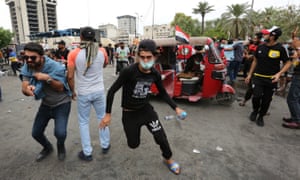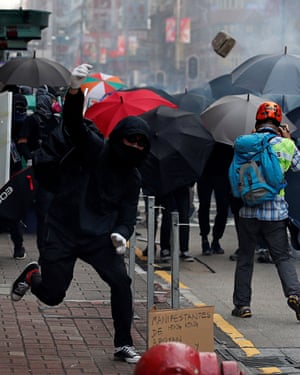Simon Tisdall
 Aspate of large-scale street protests around the world, from Chile and Hong Kong to Lebanon and Barcelona, is fuelling a search for common denominators and collective causes. Are we entering a new age of global revolution? Or is it foolish to try to link anger in India over the price of onions to pro-democracy demonstrations in Russia?
Aspate of large-scale street protests around the world, from Chile and Hong Kong to Lebanon and Barcelona, is fuelling a search for common denominators and collective causes. Are we entering a new age of global revolution? Or is it foolish to try to link anger in India over the price of onions to pro-democracy demonstrations in Russia?
Each country’s protests differ in detail. But recent upheavals do appear to share one key factor: youth. In most cases, younger people are at the forefront of calls for change. The uprising that unexpectedly swept away Sudan’s ancien regime this year was essentially generational in nature.
In one sense, this is unsurprising. Wordsworth expressed the eternal appeal of revolt for the young in The Prelude, a poem applauding the French Revolution. “Bliss was it in that dawn to be alive, But to be young was very Heaven!” he declared. Wordsworth was 19 years old when the Bastille was stormed.
Yet while younger people, in any era, are predisposed to shake up the established order, extreme demographic, social and political imbalances are intensifying present-day pressures. It is as if the unprecedented environmental traumas experienced by the natural world are being matched by similarly exceptional stresses in human society.
There are more young people than ever before. About 41% of the global population of 7.7 billion is aged 24 or under. In Africa, 41% is under 15. In Asia and Latin America (where 65% of the world’s people live), it’s 25%. In developed countries, imbalances tilt the other way. While 16% of Europeans are under 15, about 18%, double the world average, are over 65.
Perhaps these protests will merge into international revolt against injustice, inequality and oppressive powers-that-be.
Most of these young people have reached, or will reach, adulthood in a world scarred by the 2008 financial crash. Recession, stagnant or falling living standards, and austerity programmes delivered from on high have shaped their experience. As a result, many current protests are rooted in shared grievances about economic inequality and jobs. In Tunisia, birthplace of the failed 2011 Arab spring, and more recently in neighbouring Algeria, street protests were led by unemployed young people and students angry about price and tax rises – and, more broadly, about broken reform promises. Chile and Iraq faced similar upheavals last week.
This global phenomenon of unfulfilled youthful aspirations is producing political timebombs. Each month in India, one million people turn 18 and can register to vote. In the Middle East and North Africa, an estimated 27 million youngsters will enter the workforce in the next five years. Any government, elected or not, that fails to provide jobs, decent wages and housing faces big trouble.
Numbers aside, the younger generations have something else that their elders lacked: they’re connected. More people than ever before have access to education. They are healthier. They appear less bound by social conventions and religion. They are mutually aware. And their expectations are higher.
That’s because, thanks to social media, the ubiquity of English as a common tongue, and the internet’s globalisation and democratisation of information, younger people from all backgrounds and locations are more open to alternative life choices, more attuned to “universal” rights and norms such as free speech or a living wage – and less prepared to accept their denial.
 Political unrest deriving from such rapid social evolution is everywhere. Lebanon’s “WhatsApp revolution” is a perfect example. Yet some protests, such as those in Hong Kong and Catalonia, are overtly political from the very start.
Political unrest deriving from such rapid social evolution is everywhere. Lebanon’s “WhatsApp revolution” is a perfect example. Yet some protests, such as those in Hong Kong and Catalonia, are overtly political from the very start.
Anti-government demonstrators protest in Hong Kong. Photograph: Ümit Bektaş/Reuters
Young Hong Kongers face familiar problems over scarce jobs and high rents. But by taking on China’s authoritarian regime, they have assumed pole position in a struggle against autocratic “strongman” rulers everywhere. Their campaign has international resonance, which is why China’s President Xi Jinping fears it.
It is difficult, if not perverse, to watch protesters risking torture and death by challenging Egypt’s dictator, Abdel Fattah el-Sisi, and not relate their daring both to Hong Kong and, say, to Kashmiris’ efforts to throw off the yoke imposed by another “strongman”, India’s Narendra Modi. When Palestinian youths taunt the Israel Defence Forces with flags and stones, are they not part of the same global fight for democratic self-determination, basic freedoms and human rights espoused by young Muscovites opposing Vladimir Putin’s cruel kleptocracy?
In this sea of protest, a common factor is the increased willingness of undemocratic regimes, ruling elites and wealthy oligarchies to use force to crush threats to their power – while hypocritically condemning protester violence. Repression is often justified in the name of fighting terrorism, as in Hong Kong. Other culprits include Saudi Arabia, Turkey, Myanmar and Nicaragua.
Another negative is the perceived, growing readiness of democratically elected governments, notably in the US and Europe, to lie, manipulate and disinform. Distrust of politicians, and resulting public alienation, is the common ground on which stand France’s “gilets jaunes”, Czech anti-corruption marchers and Extinction Rebellion. As William Hazlitt, the 18th-century essayist and celebrated mocker of Wordsworth might have said, disbelief is the new spirit of the age.
Perhaps these protests will one day merge into a joined-up global revolt against injustice, inequality, environmental ruin and oppressive powers-that-be. Meanwhile, spare a thought for a different type of protest – the one you never hear about – and what that may entail. The stifling silence that hangs over North Korea’s gulag, China’s Xinjiang and Tibet regions, and dark, hidden places inside Syria, Eritrea, Iran and Azerbaijan could yet descend on us all. What helps protect us is the noisy, life-affirming dissent of the young.
As the climate crisis escalates...
... the Guardian will not stay quiet. This is our pledge: we will continue to give global heating, wildlife extinction and pollution the urgent attention and prominence they demand. The Guardian recognises the climate emergency as the defining issue of our times.
You’ve read 10 Guardian articles in the last month – made possible by our choice to keep Guardian journalism open to all. We do not have a paywall because we believe everyone deserves access to factual information, regardless of where they live or what they can afford.
Our independence means we are free to investigate and challenge inaction by those in power. We will inform our readers about threats to the environment based on scientific facts, not driven by commercial or political interests. And we have made several important changes to our style guide to ensure the language we use accurately reflects the environmental catastrophe.
The Guardian believes that the problems we face on the climate crisis are systemic and that fundamental societal change is needed. We will keep reporting on the efforts of individuals and communities around the world who are fearlessly taking a stand for future generations and the preservation of human life on earth. We want their stories to inspire hope. We will also report back on our own progress as an organisation, as we take important steps to address our impact on the environment.
No comments:
Post a Comment